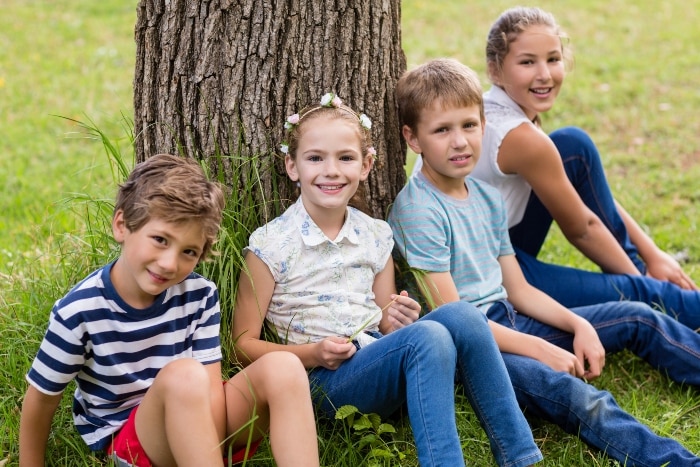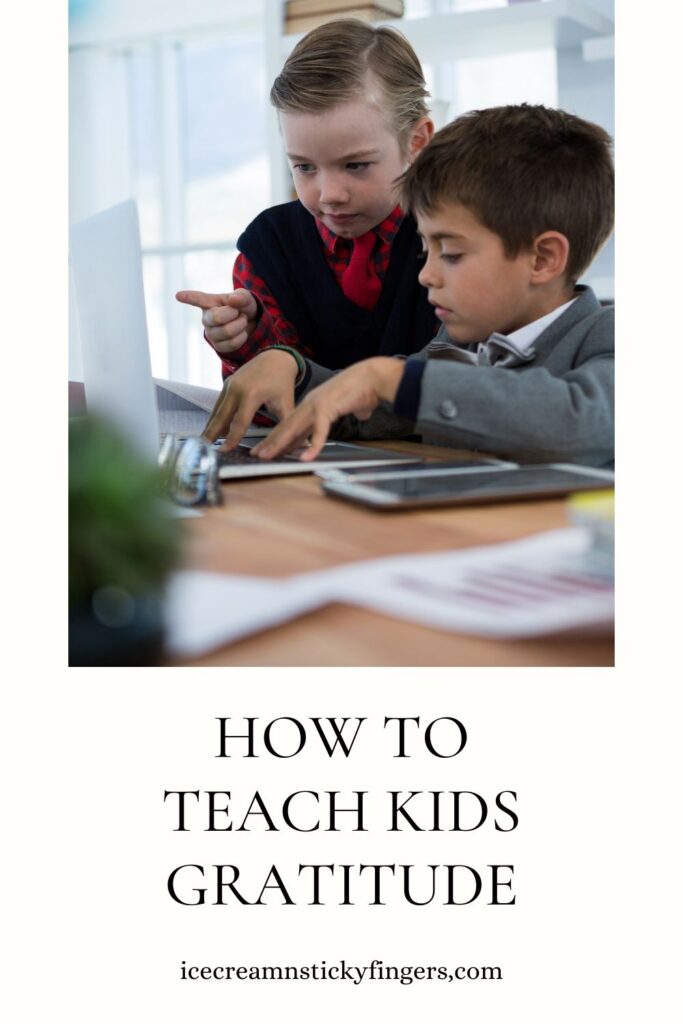Teaching kids gratitude is an important aspect of their emotional and social development. Gratitude helps them appreciate the positive aspects of their lives and fosters empathy and good manners. Here are some strategies on how to teach kids gratitude:

Encourage Reflection
Help children reflect on their own feelings of gratitude. Ask open-ended questions like, “What made you happy today?” or “What are you thankful for right now?” This prompts them to actively think about and articulate their feelings of gratitude.
Encourage Acts of Kindness
Sway children to perform acts of kindness for others without expecting anything in return. This could be as simple as helping a friend or family member, sharing, or saying kind words to someone.
Teach the Value of Hard Work
Help children understand the effort that goes into providing for their needs and wants. This can foster gratitude for the hard work of parents, teachers, and others who contribute to their well-being.
Connect Gratitude to Nature
Spend time in nature and teach children to appreciate its beauty and wonder. Encourage them to be thankful for the environment and all the resources it provides.
Emphasize Perspective-Taking
Do encourage children to put themselves in other people’s shoes. This helps them understand different perspectives and appreciate the circumstances and feelings of others.
Encourage Mindfulness
Teach kids to be present and mindful in the moment. Gratitude often stems from being aware and appreciating what’s happening around them. Simple practices like mindful breathing or observing nature can instill a sense of appreciation.
Discuss Privilege and Diversity
Help children understand that not everyone has the same opportunities or experiences. Discuss the concept of privilege and encourage empathy by learning about different cultures, traditions, and socio-economic backgrounds.
Encourage Self-Reflection
Guide children in reflecting on their own actions and feelings. Discuss moments when they’ve felt thankful or when someone did something kind for them. This helps them recognize and appreciate acts of kindness directed toward them.
Encourage Gratitude Amidst Challenges
Help children find the positive aspects even in challenging situations. Discuss what they’ve learned or how they’ve grown from difficult experiences. This teaches resilience and an appreciation for personal growth.
Be a Grateful Role Model
Children learn by observing their parents and caregivers. Show gratitude in your own life by expressing thanks for even the small things. When children see you being thankful, they are more likely to adopt the same attitude.
Start Early
You can introduce the concept of gratitude to children as young as toddlers. Encourage them to say “thank you” when they receive something or when you do something nice for them. Be consistent in modeling this behavior.
Practice Daily Gratitude
Incorporate gratitude into your daily routine. At mealtimes or before bedtime, have a family gratitude moment where each member shares something they are thankful for that day. Keep it age-appropriate and encourage kids to express their feelings.

Create a Gratitude Journal
For older children, introduce the idea of keeping a gratitude journal. Encourage them to write or draw things they are thankful for each day. This activity can help them reflect on positive aspects of their lives.
Volunteer as a Family
Volunteering together as a family can help children understand that not everyone has the same privileges. Working with others in need can foster empathy and gratitude for what they have.
Limit Materialism
Always encourage your children to appreciate experiences and relationships over material possessions. Discuss the value of these things and how they contribute to happiness and well-being.
Be Mindful of Your Language
Inspire your children to avoid entitlement by being mindful of the language they use. Teach them to ask for things politely and to express their desires without demanding.
Teach the Value of Sharing
Emphasize the importance of sharing and generosity. Encourage children to share their toys, time, and resources with others. Explain how this can make both parties happy.
Show Gratitude in Challenging Times
Help your children understand that gratitude isn’t just about being thankful when everything is perfect. Teach them to find silver linings and lessons in difficult situations. For example, when facing a setback, discuss what they learned from the experience.
Suggest Kids Write Thank-You Notes
Teach your children to write thank-you notes when they receive gifts or acts of kindness. This not only shows gratitude but also develops their writing and communication skills.
Use Books and Stories
Read books and stories that emphasize gratitude and kindness. Discuss the lessons and feelings portrayed in these stories with your children.
Reinforce Positive Behavior
When you notice your child displaying gratitude, acknowledge and praise their actions. Positive reinforcement can motivate them to continue practicing gratitude.
Encourage Gratitude Through Art and Creativity
Engage children in creative activities that focus on gratitude. This could involve making gratitude jars, creating thank-you cards, or drawing pictures of things they are thankful for.
Be Patient and Consistent
Cultivating a sense of gratitude takes time. Be patient with your children and continue to reinforce the value of gratitude in various aspects of their lives consistently.
Remember that teaching gratitude is an ongoing process. Be patient and consistent in your efforts, and adapt your approach to your child’s age and developmental stage. Ultimately, the goal is to help them develop a lifelong appreciation for the people and things that enrich their lives.

Do you want to know how to teach kids gratitude? What did you find most surprising?







This is so important to do. I always teach my kids to be grateful for what they have. And to be kind to others.
I particularly love the idea of encouraging acts of kindness and connecting gratitude to nature. It’s so important to instill these values early on.
I love the point about “encouraging acts of kindness”. The world definitely could use more kindness right now.
Teaching our children to be kind, supportive and grateful is so important. This would make them humble ❤️. Thanks for sharing these helpful tips 🙂.
These are great ideas to start to teach kids gratitude. I think gratitude is the key to happiness!
I love everything you’ve said in this article especially teaching kids with an act of kindness.
I totally agree with you! It is very important to teach kids gratitude.
I love how you pointed out privilege and diversity because this is the reality that we all face and that our kids would be able to relate better to others when they understand this.
Gratitude is so very important.. and I always tell my kids to be thankful for all they are and have..
Being thankful is special for family,By teaching our childern how to be gratiful for everyone that has taught them about being gratitude. thanks for sharing.
This is such an important thing to teach! I wish more parents would read this!
Love this post and such an important lesson that all kids need more of these days. I appreciate you sharing and this is such and important lesson for the kids!
This is such an important thing, I think especially in this day and age. I feel like I see a lot of people in general not acting grateful and are more entitled.
Those are some great points to keep in mind and it’s good to practice gratitude even at a young age, will help them out big time in the long run.
Teaching children gratitude helps them appreciate what they have, fostering empathy and kindness towards others. It also promotes a positive mindset, leading to increased happiness and overall well-being in the long run- so I couldn’t agree more with the premise of this post!
Such great advice to teach such an important skill
This is so beautiful. I agree with you that it is important that we teach our children to continue being grateful even in challenging situations.